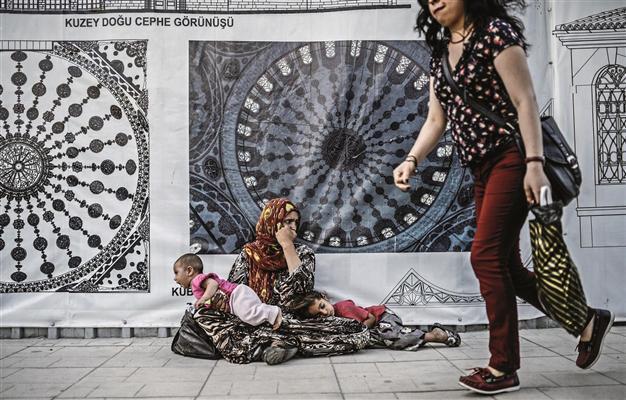Turkish deputy PM concerned over growing Syrian refugee population
ANKARA

A Syrian woman begs with her children downtown Istanbul on July 16. AFP Photo / Bülent Kılıç.
Deputy Prime Minister Beşir Atalay has sought to allay widening concerns over the growing number of Syrian refugees begging on streets as well as over the cheap labor force provided by the refugees, while calling on provincial administrations to deal with the issue, via assistance from civil society if necessary.
Recalling that Turkey has so far built 22 camps mostly in provinces close to the border with Syria to host refugees fleeing the ongoing civil war, Atalay said Aug. 1 and noted that the camps were currently hosting 220,000 refugees and that there was space in camps for 30,000 more people.
“The data that we have for the moment concerning the [refugee] population outside of the camps is 1,104,000 people,” Atalay said, speaking at a joint press conference with Fuat Oktay, the president of the Prime Ministry’s Disaster and Emergency Management Directorate (AFAD).
“We are still trying to register all of these [people]. Those housed in camps are all registered, and around 60 percent of those outside the camps are also registered,” Atalay said.
Acknowledging that conditions have been forcing some of the refugees to beg on streets, Atalay particularly underlined that there was still space in camps. They also sent a related circular to governors, he said, without elaborating on the content of the circular.
“We still have vacant places in our camps. Do not allow scenes like begging. Civil society organizations there can also help these [people]. But if you send them to camps, we have vacant places. We can build new camps too, we are looking for venues. We don’t want such scenes for our Syrian siblings,” Atalay said.
When reminded of allegations that some business owners have been employing Syrian refugees as a cheap labor force and asked whether the government had any plan to deal with the situation, Atalay responded in the negative. “So far, the government hasn’t taken any decision on this issue. That’s to say, we didn’t have any practice of granting a collective or partial work permit,” Atalay said.
As Turkey struggles with the influx of over a million refugees, the hospitality of locals is starting to wear thin. Syrian beggars have become increasingly visible in Istanbul, including women and young children, passports in outstretched hands, tapping on car windows in the city’s dense traffic.
They represent a tiny fraction of the Syrians sheltering in Turkey, some housed in well-equipped camps along the border, others living with friends or family or in modest rented accommodation in cities in the southeast, Ankara or Istanbul.
But what feels like a growing number are living in derelict buildings or sleeping in parks, eking out a living by begging – illegal in Istanbul – and raising the concerns of locals and other Syrians trying to integrate seamlessly into Turkish life.
No delay in resolution processMeanwhile, Atalay also stated that by the end of summer, the government aims at completing a “roadmap” for the revival of the stalled peace process with the outlawed Kurdish Workers’ Party (PKK), adding that the more “concrete” roadmap would include exact deadlines.
According to Atalay, different segments of society have embraced a reform bill which went into force in mid-July. Atalay was referring to the bill which gives a legal framework to the government-led peace process with the PKK.
“It will not be delayed,” Atalay said, referring to the peace process which the government prefers to call a resolution process. “During the summer, we will complete our roadmap,” he added.
